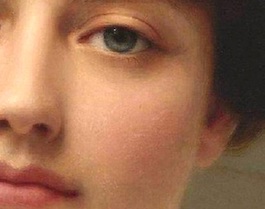Love First Learned from a Lady
- JOHN CUDDEBACK
"But love, first learned in a lady’s eyes…" Shakespeare, Love’s Labours Lost
 It has been said that woman specializes in loving. There is a profound truth in this. It is not that men do not know how to love or are not called to love. But women, especially in their universal call to motherhood, exemplify a root feature of true love: affirming a person for who he is.
It has been said that woman specializes in loving. There is a profound truth in this. It is not that men do not know how to love or are not called to love. But women, especially in their universal call to motherhood, exemplify a root feature of true love: affirming a person for who he is.
Some might think that saying woman specializes in loving is a throw-away line: an attribution that sounds grand but in fact has little content. I disagree. The facts on the ground suggest otherwise.
I have seen with my own eyes something before which I stand in reverent silence — even as I behold it again in my memory. Each time my wife welcomed one of our newborn children into the world, she looked into that child's eyes and said something. The words she said are not important. A baby does not and need not comprehend the words.
For here the words are but a vehicle for a deeper message, a message scarcely susceptible of verbal articulation. "It is so good that you exist!" "Your very being makes me rejoice!"
This encounter — the one I saw with my own eyes, and in which I too received something ineffable — stands as a foundation. It is a signal moment in a mother's love: a love that started earlier and endures and grows long after.
I wonder about the playwright's reference to a lady's eyes. The direct reference would seem to be marital love. But Shakespeare, ever philosophical in bent, might well intend to play on a rich ambiguity. In what lady's eyes does one first learn love?
The relation of motherly and wifely love is profound; there is real distinction and real continuity. Each in its own way and own place gives life — both to the receiver and the giver!
There is so much here for reflection: just what is the difference between a mother's love and a wife's love? What elicits each and what are their effects? And what about a father's and a husband's love — how are they different from and interface with mother's and wife's? So many gifts to discern, and to receive, and to give.
Shakespeare has suggested a firstness in learning love from a lady. Perhaps the firstness is in the natural order of a person experiencing love — as a child in the arms of its mother. This of course beckons us to consider the origin of the mother's love, and how it might involve and convey the love of others too. I for one will keep reflecting on this.
Yet this much already I see with Shakespeare: all of us, men and women, to some extent have learned love in a lady's eyes. And we still can, if we are willing to look and receive. And for this, I am deeply grateful.
 This is Meaghen Gonzalez, Editor of CERC. I hope you appreciated this piece. We curate these articles especially for believers like you.
This is Meaghen Gonzalez, Editor of CERC. I hope you appreciated this piece. We curate these articles especially for believers like you.
Please show your appreciation by making a $3 donation. CERC is entirely reader supported.

Acknowledgement
 John A. Cuddeback. "Love First Learned from a Lady." LifeCraft (October 20, 2021).
John A. Cuddeback. "Love First Learned from a Lady." LifeCraft (October 20, 2021).
Reprinted with permission from the author, John A. Cuddeback.
The Author
 John Cuddeback is professor of Philosophy at Christendom College and the author of True Friendship: Where Virtue Becomes Happiness and Aristotle's Ethics: A Guide to Living the Good Life. He and his wife Sofia consider themselves blessed to be raising their six children—and a few pigs and sundry—in the shadow of the Blue Ridge on the banks of the Shenandoah.
John Cuddeback is professor of Philosophy at Christendom College and the author of True Friendship: Where Virtue Becomes Happiness and Aristotle's Ethics: A Guide to Living the Good Life. He and his wife Sofia consider themselves blessed to be raising their six children—and a few pigs and sundry—in the shadow of the Blue Ridge on the banks of the Shenandoah.




